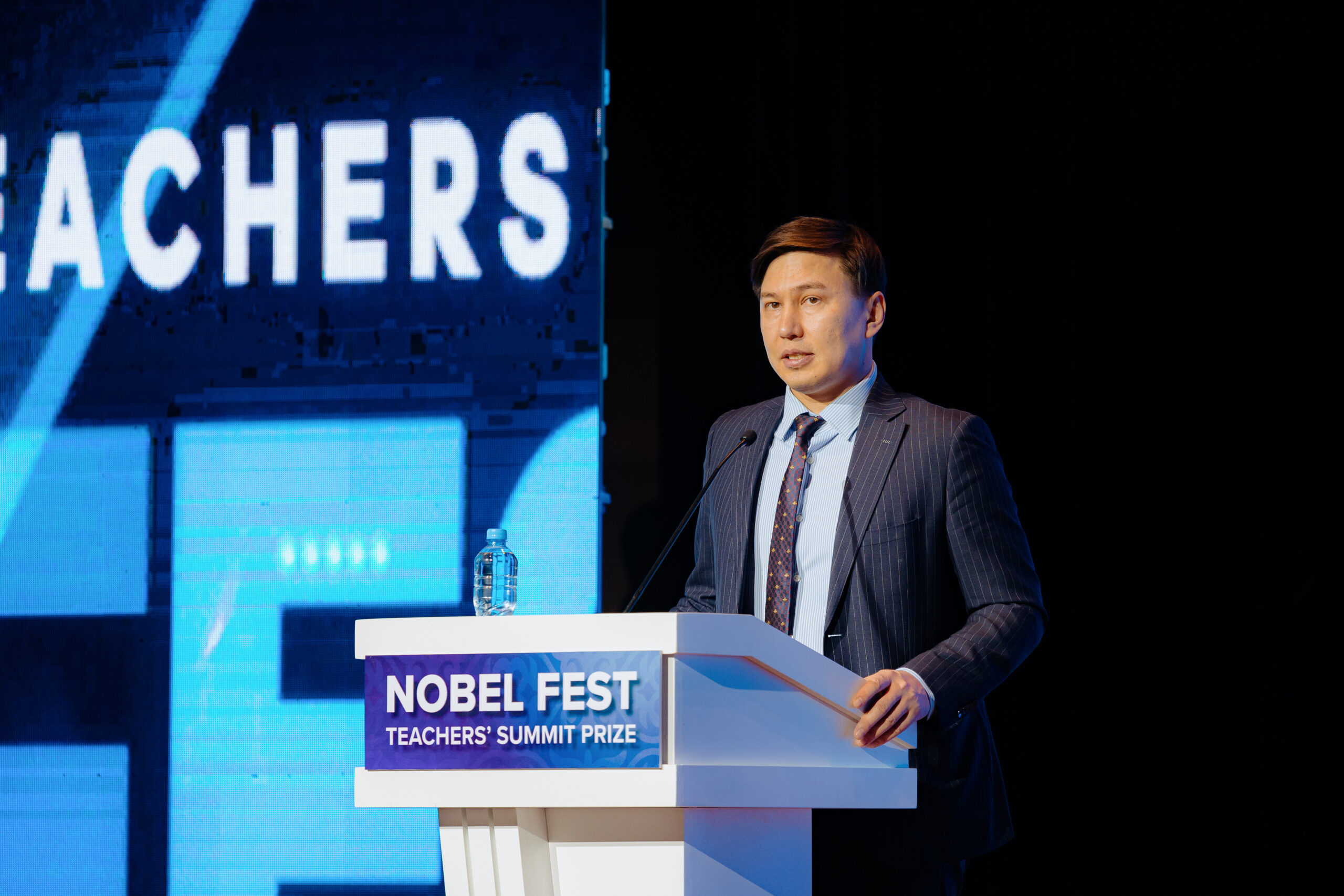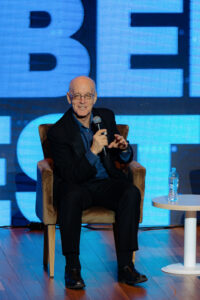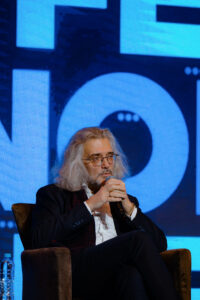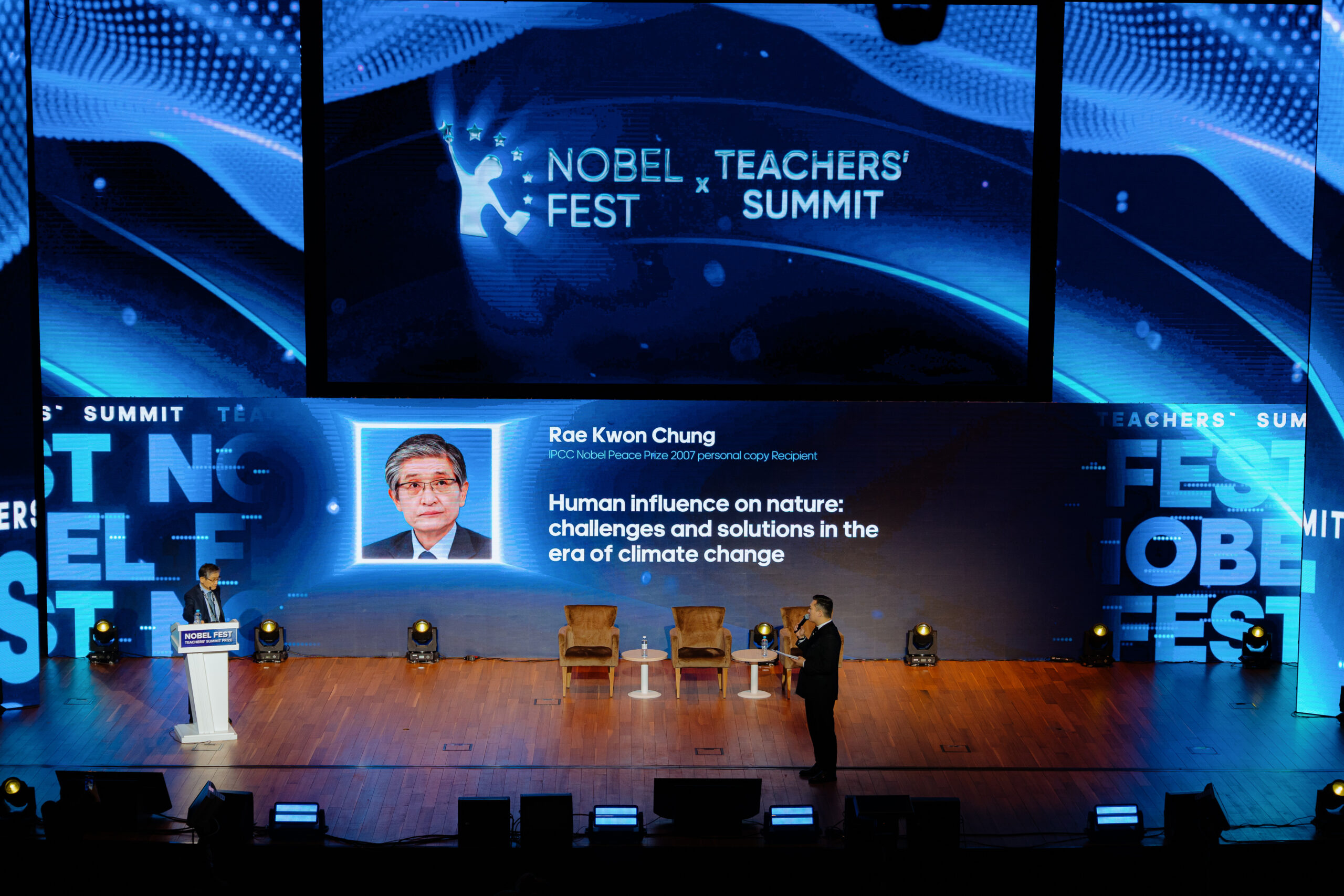ASTANA — The Nobel Fest and Teacher’s Summit: World Knowledge Week commenced in Astana on Nov. 21, bringing together global experts and thought leaders to discuss pressing issues and future possibilities in artificial intelligence, education and beyond. The three-day event aims to foster dialogue and collaboration on innovative solutions to global challenges.

Maksat Kurbenov, CEO of Nobel Fest, highlights the importance of Kazakhstan’s active engagement in the global innovation ecosystem. Photo credit: Nobel Fest
In his opening remarks, Maksat Kurbenov, the CEO of Nobel Fest, highlighted the importance of Kazakhstan’s active engagement in the global innovation ecosystem.
“Since 2009, we have worked tirelessly to popularize science in Kazakhstan, organizing lectures with Nobel laureates and initiating programs such as the National Teacher of Kazakhstan Award,” he said, noting the summit’s role in transforming education and supporting teachers nationwide.
Keynotes Highlight AI’s Transformative Potential

Gary Bolles, Chair for the Future of Work with Singularity University. Photo credit: Nobel Fest
The sessions opened with a keynote by Gary Bolles from the United States, who is a globally recognized thought leader and consultant focused on the rapidly evolving landscape of work, education and organizational transformation in the post-pandemic era driven by exponential technologies. He addressed the impact of artificial intelligence (AI) on the labor market, offering a perspective that AI will redefine jobs rather than replace them.
“I am a child of Silicon Valley. I started working there in 1983, so you can do math. Technologies and AI are wonderful servants, but not good masters. That is, we should not think that AI technology will suddenly erase all these jobs. It doesn’t. It does not work like that,” said Bolles.
“Technology disrupts but also creates opportunities. Our responsibility is to help people adapt, fostering skills like problem-solving, creativity and empathy that AI can’t replace,” he added.
Bolles urged educators to adopt a growth mindset to keep pace with rapid technological advances, envisioning a future where humans and AI work together to tackle complex challenges.
“The dirty little secret of Silicon Valley is that nobody is correct and up to date. Nobody knows all these different technologies that are coming up. We just kind of pretend that we think we do, but there is just no way that any single human can possibly encompass all of these changes,” said Bolles.
Genetics, climate action and education reforms

Konstantin Severinov during a lecture on genetics. Photo credit: Nobel Fest
Other notable sessions included Russian molecular biologist Konstantin Severinov’s lecture on genetics. The renowned scientist debunked myths about ‘talent’ or ‘intelligence’ genes, explaining that life outcomes are shaped by chance events and choices rather than genetic determinism. He encouraged the audience to embrace personal agency in shaping their paths, framing genetics as an open field of possibilities.
The event also addressed environmental issues with a prominent advocate for climate action from South Korea, Rae Kwon Chung, who was a member of the Intergovernmental Panel on Climate Change (IPCC) team that was awarded the 2007 Nobel Peace Prize. During the session, Chung identified the predominant top-down approach as a major flaw in climate change policy, where negotiations are led only by governments, which impose targets on businesses and leave out the consumers.
“Progress has been slow (…) We cannot expect the UN, governments, or businesses to solve the climate crisis without the involvement of people,” he said.
To address these systemic issues, Chung proposed a bottom-up approach with personally determined contributions (PDC) to complement the nationally determined contributions (NDC) in the Paris Agreement.

Rae Kwon Chung prominent advocate for climate action. Photo credit: Nobel Fest
‘Each one of us must make our own contribution. Governments cannot succeed if individuals are not involved,” he said, emphasizing the need for personal accountability in tackling the climate crisis.
To incentivize action, Chung proposed the creation of voluntary markets where consumers could choose to pay higher prices for carbon-free energy. “The main source of the problem is that we have only one price for electricity, whether it is carbon-free or not. We need price differentiation,” he noted.
By accepting higher costs for sustainable energy, individuals can contribute directly to reducing emissions and supporting the energy transition.
A platform for the future of learning and global collaboration
The summit’s extensive agenda also included sessions on preparing for future pandemics, fostering harmonious connections, and strategies for building an intellectual nation. A particular highlight was the Teacher’s Summit, which explored the evolving roles of parents and educators in an era of rapid innovation.
“This festival is a vital space for addressing pedagogical, medical, and social issues, fostering sustainable development in Kazakhstan,” said Evgeny Yan, the president of the Kazakhstan Association of Cognitive Behavioral Therapy.
The second day of the Nobel Fest hosted the Teachers’ Summit, featuring sessions on the future of education. Discussions explored transformative ideas about schooling and the evolving roles of parents and educators in an innovative era. The event culminated with the The Teacher of Kazakhstan national award presentation.
The highlight of World Knowledge Week is the grand ceremony of The Teacher of Kazakhstan award, which will announce the top 10 finalists. The winner will receive 10 million tenge (US$20,000), while each finalist will be awarded 1 million tenge (US$2000).
The winner of this award gets one step closer to the world-renowned Global Teacher Prize, with a prize fund of $1 million.
